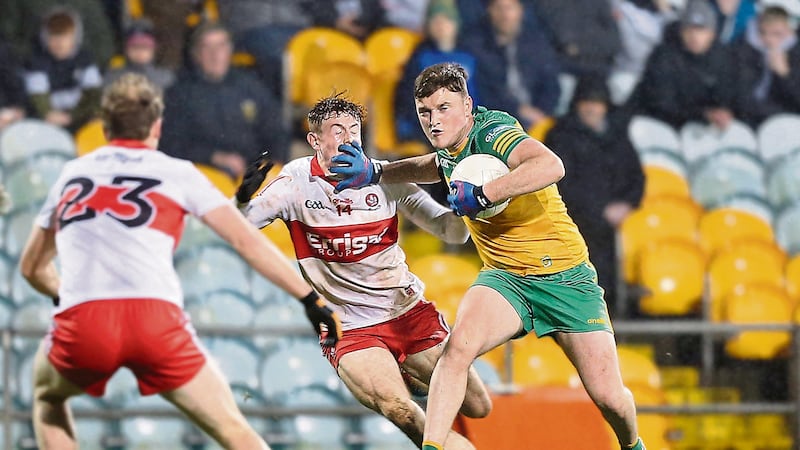GAA REFEREES’ chief Donal Smyth says the GAA’s decision to change the advantage rule will “probably” lead to more frees being given but that the officials have no choice but to implement them.
Congress voted earlier this year to reword the advantage rule for both football and hurling, with the new rule being interpreted as the awarding of a free to be the actual advantage in the majority of cases.
Speaking to the media during a briefing on the new rules yesterday, Smyth said that referees would “have to get on with what the rule said.”
“The reality is that’s what the rule is at the moment, Congress decided in their wisdom that’s the way they wanted the game refereed and that’s what the rule says.
“Referees will have to get on with what the rule says rather than thinking of the way it should have been.
“There were plusses and minuses of both, but the rule is the rule at the moment and that’s the way it will have to be implemented.
“Will it lead to more frees? Probably. That leads to a different conversation that the referee’s not involved in.”
Smyth also said that his inclination would be to tell referees to award the penalty when a foul is committed, rather than allow any potential goalscoring chance to develop.
A new rule governing the denial of goalscoring opportunities in both codes will see a penalty given and a sin-bin for the offender for cynical offences inside the 20m line or ‘D’.
Smyth said referees can play the advantage but admitted they would potentially be penalising the attacking team by not giving them the penalty kick.
“The issue becomes what if he puts the ball over the bar?
''My inclination here is for the referee to blow the whistle and give the penalty.
''It would be not to play advantage in that circumstance, to give the penalty on a goalscoring opportunity.
However, a pull-back rather than a pull down, or any tackle worthy of a red card that occurs outside the large rectangle, would only lead to a free-kick being awarded rather than a penalty.
GAA Playing Rules
Update: May 5 2021
SUMMARY
1. Denying a goalscoring opportunity (2021 Senior Inter-County League and Championship)
2. Advantage Rule (In at all levels)
3. Temporary substitution: Head Injuries (In at all levels)
4. Misconduct at Games by Team Officials (In for 2021 Inter-County, and club in 2022)
5. Interfering with a kick/puck out (In at all levels)
6. Additional New Rules to Note: (In at all levels)
** Aggressive Infractions
** Number of Players
Hurling | Denying a Goalscoring Opportunity
If any of the following infractions are committed, on an attacking player with a goal-scoring opportunity, either inside the 20-metre line or the semi-circular arc
(a) To pull down an opponent or
(b) To trip an opponent with hands, arm, leg, foot, or hurley or
(c) To use the hurley in a careless manner (5.6)
the following penalties shall apply -
(i) A Penalty Puck shall be awarded to the team affected.
(ii) Additional to being issued a Caution (Yellow Card), the offender shall be sent to the Sin Bin for 10 minutes.
Exception: If the Infraction is a second Cautionable Infraction or one that merits a straight Red Card, the offender shall be ordered off for the remainder of the game, including Extra-Time when played.
• Not all yellow cards come under this cynical behaviour rule - only those listed are to be considered under this rule.
• All other infractions remain unchanged. • It is the decision of the Referee as to whether it is a goal-scoring opportunity or
not, but it must be inside the 20m line or the semi-circular arc. Key factors the referee should consider:
• Where the foul occurred?
• How many defenders are between the attaching player and the goals?
• Could another defender make a tackle before reaching the goals?
• How many players are in the area in front of the goals?
• If it is not a goal scoring opportunity a yellow card and a free will be awarded. • This rule applies to Senior Inter-County League & Championship only in 2021.
Football | Denying a Goalscoring Opportunity
• If a Category II Infraction – Cynical Behaviour is committed, on an attacking player with a goal-scoring opportunity, either inside the 20-metre line or the semi-circular arc, a Penalty Kick shall be awarded to the team affected.”
• There is no change to the cynical behaviour fouls. The rule change allows a Referee to award a penalty kick if the infraction is committed inside the 20m line or the semi-circle and the Referee deems it to be a goal-scoring opportunity.
• All other black cards and consequences continue as before.
• It is the decision of the Referee as to whether it is a goal-scoring opportunity or not. However, it must be inside the 20m line or the semi-circular arc. Things the referee should consider:
• Where the foul occurred
• How many defenders are between the attaching player and the goals
• Could another defender make a tackle before reaching the goals?
• How many players are in the area in front of the goals?
• If a player commits a Cynical Behaviour infraction within the 20-metre line or the semi-circular arc and outside the large rectangle, and it is not a goal-scoring opportunity, the referee will deal with foul as per rule i.e. issue the card and award a free-kick.
• This is only for Senior Inter-County League & Championship 2021.
Sin Bin
• The player shall be sent to Sin Bin for 10minutes.
• Exception, a player who had earlier been issued a yellow, shall be shown a red card, and sent off for the remainder of the game, including extra time.
• If a player is in the Sin Bin with an unexpired period and the game goes to extra time, the team shall start extra time with 14 players.
• If a player has been sent off during normal time with a Red card (either a straight red or a double yellow), he can be replaced for the start of extra time as per rule.
• The 10 minutes begin when the Referee restarts the game.
• The player shall return to play at the next break in play after the 10 minutes has elapsed.
• If the player returns to play without the permission of the Referee at a break in play, he will be penalised with a yellow card (Rule 6.1 Challenging the Authority of the Referee) and then given a red card.
• If a goalkeeper is sent to the sin-bin, it is at the discretion of the relevant team management as to how to address this matter
(e.g. they may choose to use a substitute and bring on their reserve goalkeeper or use a player already on the pitch as a goalkeeper, who will need a distinctive top to have the goalkeeper privileges).
• If the player while in the Sin Bin commits another aggressive infraction, he shall be issued with an appropriate card and cannot return to the game.
Advantage Rule | Change
• When an Aggressive Foul is committed, the Referee may allow the play to continue if he considers that this presents the potential of a goal-scoring opportunity or another advantage to the team offended by creating or capitalising on time and space.
• He shall signal the advantage by raising an arm upright and shall allow the advantage to run by maintaining his arm in the upright position for up to five seconds after the foul or for less time if it becomes clear that no advantage has accrued.
• If he deems no advantage to have accrued, he may subsequently award a free for the foul from where it occurred, except as provided under Exceptions (v) and (vi) of Rule 2.2. He shall also apply any relevant disciplinary action.
• This is a major change to the wording of the rule.
• Advantage can only be played in two circumstances:
• Goal scoring opportunity
• By creating or capitalising on time and space.
• A goalscoring opportunity is for the Referee to decide but should be a clear opportunity.
• Creating or capitalising on time and space, effectively means that advantage should only be played when the player that is fouled is clear and has time and space. If a player is surrounded and being tackled the Referee must penalise any foul play by awarding the free.
• Once the referee has decided to give advantage, they shall signal the advantage by raising an arm upright and shall allow the advantage to run by maintaining his arm in the upright position for up to five seconds after the foul or for less time if it becomes clear that no advantage has accrued.
• If he deems no advantage to have accrued, the referee may subsequently award a free for the foul from where it occurred.
• Within the five seconds, if the player who received the advantage is fouled again, and as per rule, the referee can play advantage again, and if no advantage has accrued, the referee may subsequently award a free for the foul from where the second foul occurred.
• Furthermore, if the player who received the advantage committees a foul within five seconds, the referee shall award a free against that player from where the foul occurred.
Temporary substitution | Suspected Head Injury
• (ii) A player who sustains a suspected head injury, if instructed by the Referee, shall temporarily leave the Field of Play for further assessment before the player’s fitness to return is determined.
• In the circumstance of either (i) or (ii) above, a Temporary Substitute may be used, and shall not count as a substitutions under Rule 2.4 (i) and (ii), Rules of Specification.
• The following acts shall not count as substitutions under Rule 2.4 (i) and (ii), Rules of Specification.
• (1) The use of the Temporary Substitute for a player instructed to leave the field under the Rule.
• (2) The return to the field of play of the injured (blood or suspected head injury) player as a direct replacement for the Temporary Substitute.
• (3) The return to the field of play of the injured (blood or suspected head injury) player as a replacement for any other player if the Temporary Substitute has previously been sent off or substituted.
Items to note around Suspected Head Injuries
Suspected Head Injury
• A concussion is a brain injury that can be caused by an impact on a player’s Head or Body.
• Over 90% of Concussions occur without a loss of consciousness therefore recognition of other signs and symptoms is crucial.
• “IT’S NOT ALWAYS A KNOCK-OUT”
A simple two-step process should be applied:
1.RECOGNISE – the Signs and Symptoms
2.REMOVE – the player from the field of play
IF IN DOUBT, SIT THEM OUT
Items to note around Suspected Head Injuries (continued)
Initial Signs: The following can be considered in assessing the nature of the impact: • The speed of the impact/collision
• Was the player braced for impact? (Did they see the impact coming)
• Was there any rotational (twisting) motion of the head/neck caused by the impact?
Indicators: The Player’s reaction:
• Did they lie motionless for any period of time?
• Were they unsteady on their feet?
• Did they clutch their head?
Red Flags | Urgent medical attention
• Possible neck or spinal Injury – player should not be moved
• Prolonged Loss of consciousness
• Deteriorating conscious state
• Convulsions / Seizures • Vomiting
• Double Vision
• Disorientation/Confusion
• Severe or increasing headache
• Abnormalities of balance or coordination
• Slurred or incoherent speech
• Weakness or tingling/burning in arms or legs
If any of the above red flags are obvious, the player MUST be removed permanently from the field of play.
Temporary substitution | Suspected Head Injury
• This rule was changed to allow for players with a suspected head injury to leave the field and be replaced by a temporary substitute to allow for medical assessment of a player.
• Only the Referee can permit a temporary substitution to be made in the case of a suspected head injury or a blood injury, i.e. if a medic or team officials suspect a head injury, they MUST notify the referee before the player is removed and replaced with a temporary substitute.
• There is no time limit for a Temporary Substitute
• There is no limit on the number of Temporary Substitutes that can be used by a team during a match
• No change to the temporary blood substitute rule
• The same protocols for a temporary blood substitute should be followed by Match and Team Officials.
Misconduct at Games by Team Officials
The following changed were made to the rules around Misconduct at Games by Team Officials and the introduction of the issuing of Card and Match Suspensions in place of Term Suspensions for several Infractions.
Misconduct at Games by Team Officials consist of five Categories of Infractions that occur on or in the vicinity of the Field of Play and which occur immediately before, during or after a Game:
Category Ia (Yellow Card)
1 To make an unauthorised incursion onto the Field of Play.
2 To challenge the authority of a Referee, Umpire, Linesman or Sideline Official.
3 To threaten or to use abusive or provocative language or gestures to an opposing player or team official.
4 To threaten or to use abusive or provocative language or gestures to a player of own team.
PENALTIES ON THE DAY FOR THE ABOVE INFRACTIONS:
(i) Caution offender by showing him a Yellow Card;
(ii) Order offender from the Pitch Enclosure for a second cautionable Infraction by showing him a second Yellow Card
followed by a Red Card. The offender is debarred from the Pitch Enclosure for the remainder of the Game, including any
Extra-Time, when played, and he may not be replaced.
Category IIa (Red Card)
1 To use abusive language to a Referee, Umpire, Linesman or Sideline Official.
2 To engage in Disruptive Conduct.
Category IIIa (Red Card)
1 Any type of physical interference with an Opposing Player or Team Official.
2 To interfere with the playing of the Game.
Category IVa (Red Card)
Minor physical interference with (e.g. laying a hand on, pushing, pulling or jostling), threatening or abusive conduct towards, or threatening language to, a Referee, Umpire, Linesman or Sideline Official.
Category Va (Red Card)
Any type of assault on a Referee, Umpire, Linesman or Sideline Official.
PENALTY ON THE DAY FOR THE ABOVE CATEGORIES IIa, IIIa, IVa and Va INFRACTIONS:
Order offender from the Pitch Enclosure by showing him a Red Card.
The offender is debarred from the Pitch Enclosure for the remainder of the Game, including any Extra-Time, when played, and he may not be replaced.
Misconduct at Games by Team Officials
• Red & Yellow cards can now be issued to Team Officials for breaches of rule.
• Match officials should follow the same protocols when issuing cards, recording, and reporting of Team Officials as they do with players.
• Any team officials sent officials sent off, can not be replaced for the remainder of the game, including Extra Time.
Interfering with a kick/puck out
• 4.19 To interfere with a player taking a free-kick, sideline kick or kick-out by jumping up and down, waving hands, or any other physical or verbal interference considered by the referee to be aimed at distracting the player taking the puck.
• Exception:
• A player holding his hands upright shall not constitute an interference.
• PENALTY FOR THE ABOVE FOULS - Free puck 13m more advantageous than the place of original kick - up to opponents’ 13 m line.”
Aggressive Infractions
The following Infractions were changed.
1. To act by deed, word or gesture of a racist, sectarian or anti-inclusion nature against an opponent or match official
A player can now be sent off and reported for the above against a Match Official.
2. The “Striking or attempting to strike” rule has been amended to cover minimal force, force and causing injury.
(Cat III) Striking or attempting to strike with arm, elbow, hand or knee with minimal force. The minimum penalty is a one-match suspension
(Cat IV) Striking or attempting to strike with arm, elbow, hand or knee either with force or causing injury. The minimum penalty is a two-match suspension
Number of Players
In the circumstances of the unavailability or late arrival of players, a team may commence a game with 13 players.
Players arriving late may join in the game during a break in play but must report to the referee before so doing. The game shall be played for the full playing time.
Provided a team has fielded 13 players, including players ordered off or retired injured, the final score shall stand as the result of the game.








